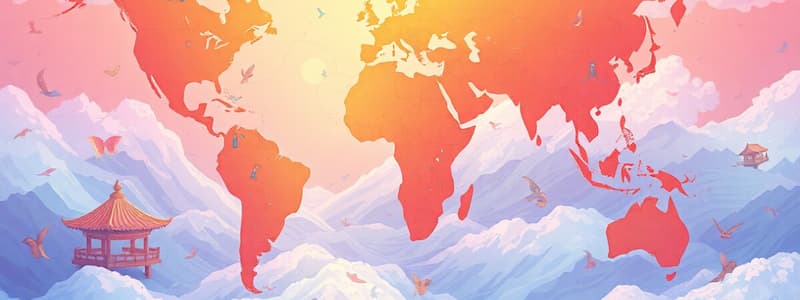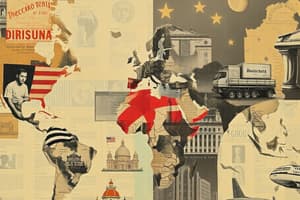Podcast
Questions and Answers
What is globalization?
What is globalization?
The sharing of culture, money, and products between countries due to international trade and advances in transportation and communication.
What does homogeneity refer to in globalization?
What does homogeneity refer to in globalization?
- Cultural diversity
- Political conflict
- Economic inequality
- Increasing sameness (correct)
Homogeneity is linked to cultural imperialism.
Homogeneity is linked to cultural imperialism.
True (A)
Name one example of homogeneity in globalization.
Name one example of homogeneity in globalization.
What is the concept of McDonaldization?
What is the concept of McDonaldization?
What does heterogeneity pertain to?
What does heterogeneity pertain to?
The term ______ was coined by Roland Robertson.
The term ______ was coined by Roland Robertson.
What does the Theory of Liberalism view globalization as?
What does the Theory of Liberalism view globalization as?
According to the Theory of Political Realism, states are inherently cooperative.
According to the Theory of Political Realism, states are inherently cooperative.
What is the role of the 'hegemon' state according to Political Realism?
What is the role of the 'hegemon' state according to Political Realism?
Flashcards are hidden until you start studying
Study Notes
Globalization Overview
- Globalization involves the sharing of culture, money, and products across countries, driven by international trade and advancements in transportation and communication.
- A theory is defined as a set of ideas aimed at explaining facts or events.
Globalization Theories
Homogeneity
- Homogeneity refers to the increasing similarity among cultures, economies, and political systems globally.
- Often associated with cultural imperialism, where dominant cultures overshadow local traditions.
- Examples include the prevalence of Christianity in certain regions and the phenomenon of Americanization.
- Global economic crises can arise due to homogeneous economic policies, particularly the IMF's "one-size-fits-all" approach.
- Media imperialism can diminish the presence of alternative media from developing nations, with movements like the Independent Media Center working to counteract this trend.
- McDonaldization describes the global spread of fast-food principles, influencing various sectors and encouraging rational systems across societies.
Heterogeneity
- Heterogeneity emphasizes diversity and the creation of varied cultural practices due to global interactions.
- The term "glocalization" signifies the blending of global forces with local influences, as introduced by Roland Robertson.
- Economic aspects also reflect heterogeneity, with the commodification of cultures resulting in differentiated global markets.
- The concept of "Jihad," as discussed by Barber, refers to rising nationalism and political diversity amid globalization.
Theories of Globalization
Theory of Liberalism
- Liberalism views globalization as a market-driven extension of modernization, motivated by human desires for welfare and liberty.
- It highlights the importance of institutional frameworks to support globalization, leading to standardized practices across borders.
Theory of Political Realism
- Political realism focuses on state power, national interests, and inter-state conflicts, highlighting the competitive nature of states.
- Some scholars advocate for a balance of power to counter dominance, while others suggest that a hegemon can establish stability in global order.
- Globalization is viewed as a strategic tool in the competition for power among major states.
Studying That Suits You
Use AI to generate personalized quizzes and flashcards to suit your learning preferences.




